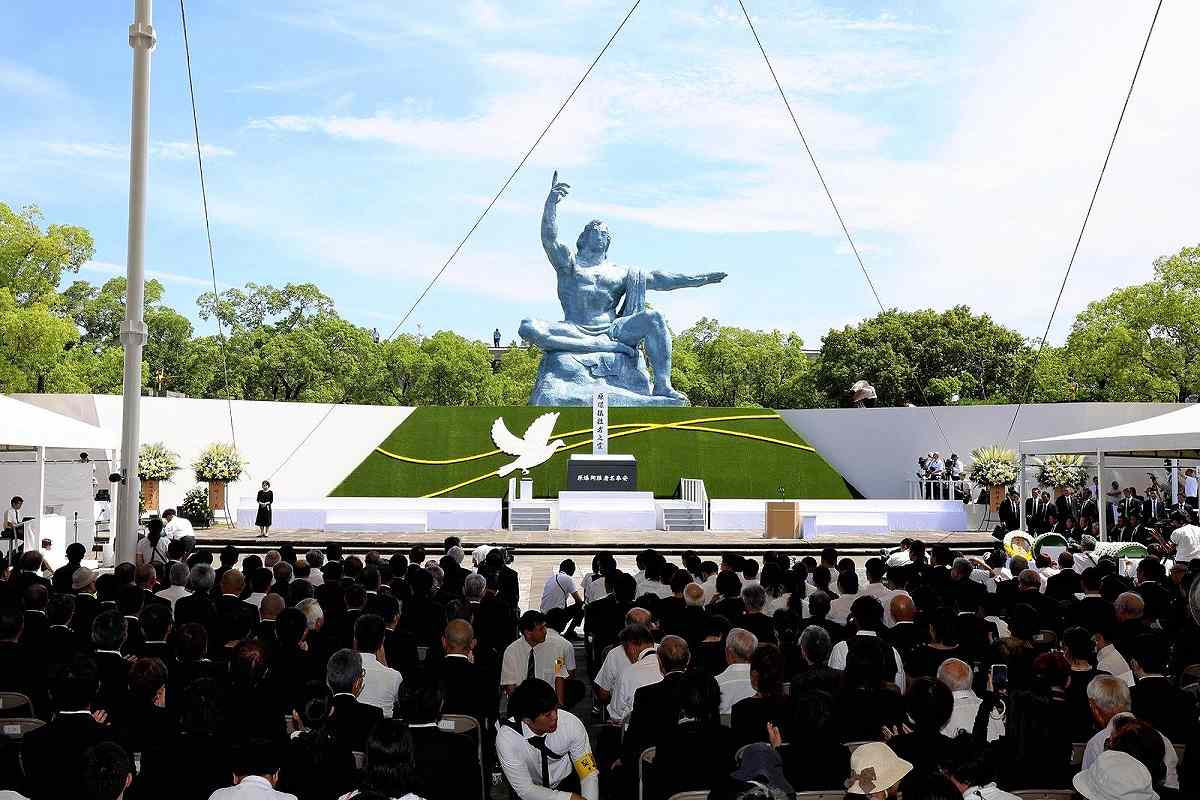Nagasaki Mayor: Nuclear Weapons ‘Threat to Humankind’;G7 Ambassadors Absent from A-Bomb Memorial Ceremony

The atomic bomb victims memorial and peace ceremony is held at Nagasaki Peace Park in Nagasaki on Friday.
16:39 JST, August 9, 2024
NAGASAKI — Survivors and victims’ family members held a memorial service marking the 79th anniversary of the U.S. atomic bombing of Nagasaki. The Nagasaki atomic bomb victims memorial and peace memorial ceremony was held at Nagasaki Peace Park, with around 3,100 survivors and family members attending to offer prayers for peace.
Also attending the ceremony, which began at 10:45 a.m., were Prime Minister Fumio Kishida and Izumi Nakamitsu, the U.N. undersecretary general and high representative for disarmament affairs. Representatives from a record 100 countries, including the United States, China, Britain and France, all of which possess nuclear weapons, attended the ceremony.
But Israel, which continues its attacks on the Palestinian territory of the Gaza Strip, was not invited to the event, which led to the absence of ambassadors from Japan’s six partners in the Group of Seven nations — the United States, Britain, Germany, France, Italy and Canada — as well as from the European Union, an unusual situation.
Russia and Belarus were not invited for a third consecutive year.
At 11:02 a.m., the time the atomic bomb exploded, a bell was rung, and all those in attendance observed a moment of silence to pray for the souls of the victims. In his Nagasaki Peace Declaration, Nagasaki Mayor Shiro Suzuki said, “Leaders of the nuclear states and states under the nuclear umbrella, you must face up to the reality that the very existence of nuclear weapons has posed an increasing threat to humankind, and you must make a brave shift toward the abolition of nuclear weapons.”
Suzuki is a “second-generation A-bomb survivor,” a term used to describe those whose parents were exposed to the bombing.
In his address, Kishida stressed that “the mission of Japan, the only country to have suffered nuclear bombings during a war, is to steadily advance realistic and practical efforts toward the realization of ‘a world without nuclear weapons.’”
He also stated, “It is because the situation regarding nuclear disarmament is becoming increasingly severe, with the deepening division of the international community over nuclear disarmament and the threat of nuclear weapons use by Russia, that we will continue to appeal strongly to the world to ‘make Nagasaki the last atomic-bombed city in the world.’”
At the ceremony, three books containing the names of 3,200 survivors of the atomic bomb who were confirmed to have died in the year through the end of July were dedicated. The total number of name-list volumes now stands at 203, bringing the total number of those who died after having been A-bombed to 198,785.
Top Articles in Society
-

Producer Behind Pop Group XG Arrested for Cocaine Possession
-

Man Infected with Measles Reportedly Dined at Restaurant in Tokyo Station
-

Man Infected with Measles May Have Come in Contact with Many People in Tokyo, Went to Store, Restaurant Around When Symptoms Emerged
-

Woman with Measles Visited Hospital in Tokyo Multiple Times Before Being Diagnosed with Disease
-

Australian Woman Dies After Mishap on Ski Lift in Nagano Prefecture
JN ACCESS RANKING
-

Producer Behind Pop Group XG Arrested for Cocaine Possession
-

Japan PM Takaichi’s Cabinet Resigns en Masse
-

Man Infected with Measles Reportedly Dined at Restaurant in Tokyo Station
-

Israeli Ambassador to Japan Speaks about Japan’s Role in the Reconstruction of Gaza
-

Videos Plagiarized, Reposted with False Subtitles Claiming ‘Ryukyu Belongs to China’; Anti-China False Information Also Posted in Japan
























